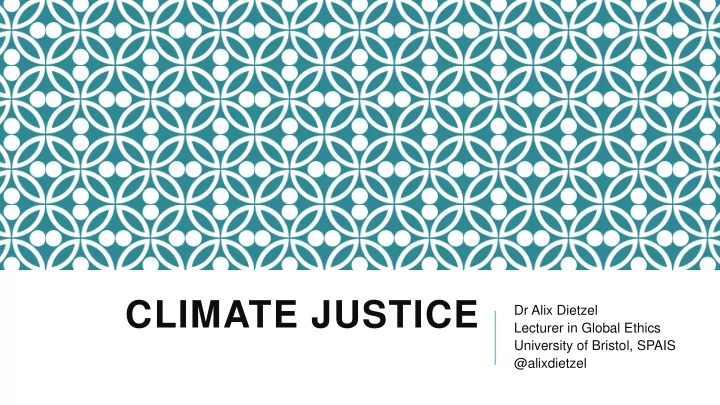

CLIMATE JUSTICE Dr Alix Dietzel Lecturer in Global Ethics University of Bristol, SPAIS @alixdietzel
OUTLINE OF TALK My Research What is Climate Justice? Why Does 1.5°C Matter, Ethically Speaking? Who Is Morally Responsible for 1.5°C? Moving Forward
MY RESEARCH Climate change justice – ethics, fairness, responsibility, human rights. Climate change policy analysis – states, sub-state actors, individuals.
WHAT IS CLIMATE JUSTICE? Climate change is, by it’s very nature, a problem of justice – specifically global justice. 1. Climate change will primarily affect those who have done least to contribute to the problem. 2. Responding to climate change requires global decisions on emissions reductions, technology development, adaptation finance, and coordination. These decisions require discussions of fairness and justice.
WHAT IS CLIMATE JUSTICE? Treating climate change as an issue of justice means: Considering the human impact of climate change across the globe. Defending the rights of future generations. Assigning moral responsibilities (to states, sub-state actors, individual) for adaptation, mitigation, technology development, etc. Exploring whether decision making processes are fair to those most affected by climate change.
WHY DOES 1.5°C MATTER, ETHICALLY SPEAKING? Climate change threatens the human rights of present and future generations (health, food, water, displacement). Climate change will result in human suffering. Climate change impacts those who have done least to contribute to the problem. We are capable of limiting global temperature changes, so we are morally obligated to do so.
WHY DOES 1.5°C MATTER, ETHICALLY SPEAKING? Sea Level Rise: around 10cm less in a 1.5°C world compared to 2°C - roughly 10 million fewer people exposed to risk. Severe Heatwaves: 14% of the world exposed to at least one extreme heatwave every 5 years in a 1.5°C world compared to 37% in a 2°C world. Water Scarcity: 271 million exposed to water scarcity in a 1.5°C world compared to 388 million in a 2°C world. GDP Per Capita: down 8% in a 1.5°C world compared to 13% in a 2°C world.
WHO IS MORALLY RESPONSIBLE FOR 1.5°C? Polluter Pays Principle (PPP) – those who cause the pollution should pay for cleaning it up. Ability to Pay (ATP) - Those who are most able to pay for cleaning up climate change should do so.
WHO IS MORALLY RESPONSIBLE FOR 1.5°C?
WHO IS MORALLY RESPONSIBLE FOR 1.5°C?
WHO IS MORALLY RESPONSIBLE FOR 1.5°C?
MOVING FORWARD The UNFCCC and the run up to the Paris Agreement are crucial – NDCs are not good enough and need to be revised. Adaptation finance needs to be prioritised. Sub-state action will be critical to push the boundaries and ensure effective, efficient, inclusive response. These actors must be supported and encouraged, but not necessarily by the UNFCCC. Wide scale systems change will be necessary. All capable actors must contribute and be held to account.
Twitter: @alixdietzel THANK YOU Email: alix.dietzel@bristol.ac.uk
Recommend
More recommend